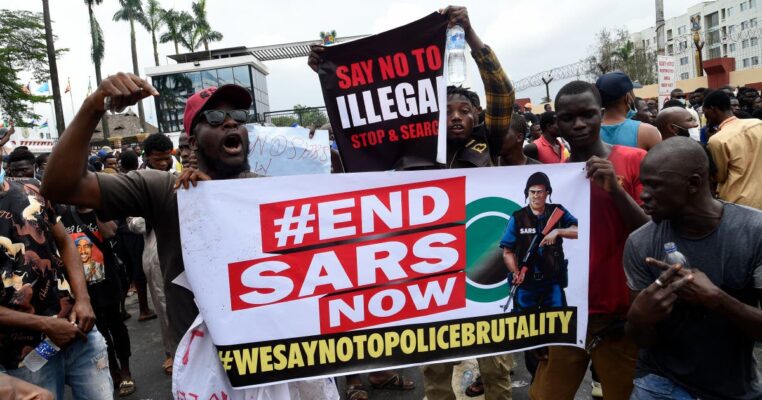Sometime in the early 80s, I published an article in the Nigeria Standard in which I predicted that there could be no revolution in Nigeria.
I gave three reasons for my claim: We are so blessed with food that we could never get hungry enough to birth a revolution; religious differences would kill any attempt at a revolution, and, ethnicity would ensure its stillbirth. When the EndSARS protests started, I thought I was going to be proved wrong. I don’t like revolutions if they must be violent or bloody. They have rarely brought any good to any country in the world, but I didn’t mind one because of the frustration I thought we were facing then. There have been less violent revolutions after all that have brought changes (even if a few lives had to be lost), like the one in Ghana and Romania. My prediction did not mean that I did not want a better Nigeria. In fact, it was because I yearned for it. Desperately.
- #EndSARS: Buhari sends Chief of Staff, others to states
- Immigration reacts as #EndSARS activist laments passport seizure
But that was the early 80s. If you were born then, you can imagine how bad things have become between then and now. Then Muhammadu Buhari came to power and started to bring sanity to our society. To me, he had started a quiet revolution, but it was short-lived; killed by Ibrahim Babangida in a 1985 coup. The impact of that short period had remained with me, until Buhari returned to power, in a flowing agbada rather than a crisp green khaki uniform. I was convinced the dress did not make the man; Buhari was Buhari. I was wrong. He had not come back with the same spirit even if he had wanted to. Then fate presented him with a gift; an opportunity in the EndSARS protests of the youth, which he appeared ready to seize, at least initially. During one of his earlier campaigns (as he chased power between 2003 and 2014) he had urged his followers to do something similar if anyone tried to upset the apple cart of their desire for change; Change, which became his campaign slogan in the 2014 election that brought him back to power. I saw Buhari in the EndSARS protests, if not the man, at least the spirit. I saw a video in which he was resisting a suggestion to organise a counter EndSARS protests, which didn’t look like fake news to me.
The social media and news channels were awash with reports, both positive and negative but I still had faith in Buhari, believing that he believed in the revolution that the EndSARS protests were engineering. But to my utter surprise, he failed to go with his conscience and seize the opportunity to prove that he was still the Buhari of the 80s. My hopes were dashed. Dashed, not only by Buhari himself and his lieutenants, but by the emergence of those factors I listed in my write-up of the early 80s that would make a revolution in Nigeria impossible. On social media, mainly from northern group platforms, I saw videos, heard audios, read texts, all condemning the protests as a southern agenda to destabilise a northerner’s government! This, in spite of the fact that the protests took place all over the country, even in core northern cities like Kano and Kaduna.
It is true that other forces such as IPOB and individuals who had scores to settle with the government, businessmen and women, or political figures had almost hijacked the protests for unwholesome causes. But this was detected very early and the protests were tactically called off. For, EndSARS as we all know, had gone beyond the demand to end SARS, to a demand for an end to bad governance, which our elected and appointed representatives have not only failed to correct, but are in fact the cause of it all. Bad governance is crushing and grinding every generation and every part of this country except the few operating it directly or those benefiting from the rot. And this is the source of my grief, for I am convinced that if this quiet revolution had taken place, the north would have been the greatest beneficiary. Ending the rot in the system would bring to an end, or at least reduce to the barest minimum, cases of killings, kidnapping, banditry, farmer/herders conflicts and the festering Boko Haram imbroglio. Countries that are advanced and peaceful do not get there because they have only good people in the government or as legislators but because they listen to the mass of the people. It is to these people the ministers and lawmakers talk before making policies and laws. It is to them they go for advice.
Unfortunately, this is not the case in Nigeria. Once elected, most of our representatives, Senators, Assemblymen, Governors, Councilors and Chairmen never go back to the people. They make the laws for themselves without any considerations for the people.
In the EndSARS protests, Nigerian youths woke us up to our responsibility; they reminded us of our responsibility to talk to those people who avoid us, and at best talk us down once we have elected them. They told us that it is our duty to demand action from our leaders. They made our leaders aware that they have taken the people for a ride for too long and that this was not going to continue forever; in fact, that the time to end it had come.
What is more, in the protests, the youth had demonstrated a rare ability for social mobilisation and organisation, for resourcefulness, for management of resources with a high degree of accountability, and to peacefully and persistently demand for a better society.
But there are many questions that will need to be addressed by all: the youth, the older generation, and particularly, the leadership of the country. What strategy do the youth have for engineering the revolution they have started? What is (should be) the role of the older generation, the parents of the youth in making the future better? The youth are looking at the future, but they know that the future starts today, and that puts the weight and the heat on the present leadership. What have they learnt from this experience? How did they handle the situation, and with what degree of success or failure? Whether he likes it or not, President Buhari knows that the buck stops on his table and that Nigerians and the world hold him responsible for the lapses in the management of this crisis, which started off as an action that his government would have immensely benefited from.
Nevertheless, there is hope, they say, as long as there is life. Buhari can still redeem his image. Inside or outside of Aso Villa, he has a date with history. There is already a Commission investigating the activities of SARS. This should be extended to the Lekki incident, if one has not been initiated already. I dare say that Nigerians know (and the protests had graduated to this) that it is not only SARS that needs to be investigated.
All other agencies of government, as well as the vexed issue of a system overhaul otherwise known as “restructuring” should be addressed as a matter of urgency. President Buhari must neglect the voices of division from the north, and the voices of division from the south. He should know that for the ‘Common’ Nigerian (and we make up 99% of the population) restructuring does not mean breaking up; it means making the country work, both as a federal system and as a functional modern society. He should seize this mood and moment, this singular opportunity to swing into action and give us the Nigeria of our dreams.
Johnson is from Department of English, Faculty of Arts, Bingham University, Karu.

 Join Daily Trust WhatsApp Community For Quick Access To News and Happenings Around You.
Join Daily Trust WhatsApp Community For Quick Access To News and Happenings Around You.


